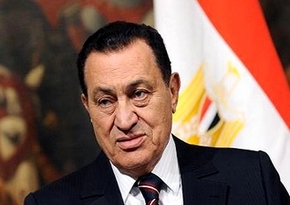 CAIRO — Egyptian President Hosni Mubarak said Thursday improving economic growth and dealing with social disparities were top priorities for the Arab world's most populous nation, challenging his political opponents to take them on.
CAIRO — Egyptian President Hosni Mubarak said Thursday improving economic growth and dealing with social disparities were top priorities for the Arab world's most populous nation, challenging his political opponents to take them on.
Near daily protests in Egypt have brought attention to rising living costs and other economic problems, giving opponents of Mubarak's three-decade rule a rallying point.
Reformists have also demanded greater political freedoms, including legal changes that would allow for freer elections and serious competition to Mubarak in next year's presidential elections.
On his annual speech to commemorate the anniversary of the military coup that toppled the monarchy in 1952, Mubarak focused on economic issues.
He said Egypt has managed to weather the global economic downturn and that its own economic growth is picking up.
He said improving economic growth through cooperation with the private sector and reducing social disparity through new legislation remain his government's top priority.
In a speech televised Thursday, he challenged opposition parties to address these issues before this year's parliamentary elections.
"Economic growth and social justice sum up the many aims that we are pursuing today, tomorrow and the day after," Mubarak said. "While I look forward to parliamentary elections that push forward our democratic experience, I call on all political parties to come up with ideas and visions to deal with these priorities_ on which there is no disagreement."
However, he avoided any mention of the opposition's demands for reforms to allow independent election supervision and ensure a fair vote.
Rights groups and opponents have complained that Egypt's elections are flawed and accuse the government of vote rigging to sway the polls in the ruling party's favor.
Opposition groups are meeting to discuss whether to boycott the elections or make their participation conditional on guarantees for a free vote.
They say constitutional changes introduced by Mubarak over the past few years have effectively made it easier to rig elections.
Opposition demands found a new impetus when former U.N. nuclear chief and Egyptian diplomat Mohammed ElBaradei returned to Egypt this year, declaring that he would seek change in his native country.
ElBaradei refuses to join any political group, saying they are controlled by Mubarak's regime, and has called on young Egyptians to join his campaign for change.
"Mubarak appears to be addressing only the political parties. He is even setting the priorities for them," said Diaa Rashwan, a political analyst with Al-Ahram Center for Strategic and Political Studies.
The 82-year Mubarak appeared visibly thinner while delivering the speech and a little pale. He underwent surgery in Germany in March to remove his gall bladder and a benign growth in the lining of his small intestine.
That set off speculation about how long he will stay in office and who will succeed him. His aides say he is in top form and is keeping a busy schedule.
Mubarak has ruled Egypt for nearly three decades. He has no clear successor and has never appointed a vice president.



